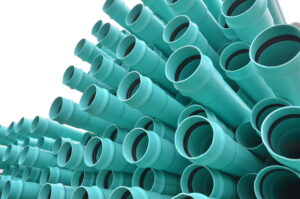
New report questions safety of PVC pipes for drinking water
Canadian Plastics
Environment Materials Plastics ProcessesThe report is 'wrong,' says plastics pipe trade group the Vinyl Institute.

Photo Credit: Adobe Stock/eugene kashko
A new report published by a coalition of U.S. environmental advocacy groups warns of what it calls “potential health risks” around the use of PVC pipes for drinking water.
The report, “The Perils of PVC Plastic Pipes,” co-published by Beyond Plastics, Environmental Health Sciences, and the Plastic Pollution Coalition, recommends state and local officials avoid using the material as well as chlorinated PVC (CPVC) for their communities’ water pipes.
“[Our] analysis raises concerns for state and local officials who will determine how to replace lead pipes in their communities, as well as for the residents who will be using the water that flows through those pipes,” the report said. “[We] identify recycled copper and stainless steel pipes as preferable alternatives. Although these materials are slightly more expensive than PVC plastic, the majority of the cost of lead service line replacement projects is from labour and digging up streets, not from the cost of the piping.”
“We recommend avoiding PVC plastic and CPVC because independent researchers have documented roughly 30 to 60 different toxic chemicals released by PVC and CPVC pipes and their fittings,” said Judith Enck, president of Beyond Plastics and former EPA regional administrator under President Barack Obama’s administration. “While individual chemicals have generally been found at very low levels, we don’t know enough about the health significance of exposure to complex chemical mixtures.”
Currently, the U.S. federal government is providing US$15 billion to municipalities that need to replace toxic lead service lines, but the report said that these funds don’t offer “guidance around what piping materials should be used to prevent homes from swapping one problematic material for another.” The report also cited the recent train derailment and chemical spill in East Palestine, Ohio, as a “vivid example” of the threat that vinyl chloride poses to Americans. The material is an “essential ingredient” of PVC, noted Beyond Plastics.
The report received immediate pushback from plastics pipe trade groups, including the Washington, D.C.-based Vinyl Institute. “The Beyond Plastics report is wrong,” Ned Monroe, president and CEO of the Vinyl Institute, said in an April 19 statement. “PVC pipes are safe with nearly 60 years of rigorous NSF testing – the legally recognized standard for water pipes in the U.S. and Canada. NSF standards and some 10 million quality control tests conducted since 1965 ensure that PVC and CPVC, safely deliver clean drinking water. Many municipal governments rely on PVC to bring clean drinking water to their residents because PVC pipes meet rigorous safety standards and last 100 years or longer.”
